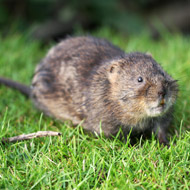Threatened water voles return to Yorkshire

The water vole is one of Britain’s most threatened mammals.
Following a 50-year absence, one of the UK’s most threatened species is returning to the Yorkshire Dales.
According to the National Trust, around 100 water voles are set to be released into the Malham Tarn - England’s highest freshwater lake.
The project is the largest of its kind ever carried out in Britain and forms part of a major new vision for land management.
“By reintroducing water voles to the Tarn, we hope to give these rare animals the chance to recolonise streams in the high Yorkshire Dales,” said Roisin Black, National Trust Ranger at Malham Tarn.
The water vole is one of Britain’s most threatened mammals. Once common, the creatures have vanished from almost 90 per cent of streams and rivers where they once lived.
Ecologists believe that Malham Tarn’s water voles were wiped out in the 1960s by mink, which escaped from local fur farms.
The National Trust say they plan to release 200 specially-bred water voles to the lake over the next two years.
It is hoped the voles will play an important part in the ecosystem at the lake, grazing the riverbank and providing space for rare plants to grow. They will also provide a source of food for struggling predators like otters and barn owls.
“We know water voles have thrived at Malham Tarn in the past. With no records of mink in the Tarn for two decades, the habitat here is perfect for water voles again,” said Roisin.
Over the coming years, rangers will monitor the health of the water vole population. Rangers are optimistic the creatures will recolonise the Tarn and its surrounding streams.



 The Veterinary Medicines Directorate (VMD) is inviting applications from veterinary students to attend a one-week extramural studies (EMS) placement in July 2026.
The Veterinary Medicines Directorate (VMD) is inviting applications from veterinary students to attend a one-week extramural studies (EMS) placement in July 2026.